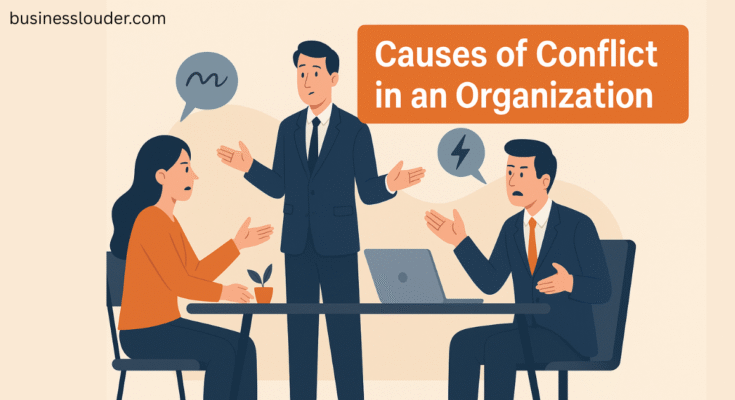Conflict is an inevitable and natural part of every individual’s lives. It can happen anywhere, and in any situation, whether at home with families, out with friends, or even at work.
Although it’s difficult to avoid conflict at the workplace, it’s, however, possible to recognize the common causes of those conflicts and resolve them.
Here in this post we explain about the causes of conflict in an organisation. Let’s first understand what causes of conflict?
What Causes of Conflict?
Every employee has their own needs and certain expectations at work. A conflict could arise in a situation when employees feel that these needs and expectations are not being met or are being ignored.
Some of the common causes of conflict in an organization could be – unfair treatment, poor management, unclear job roles, poor communication, poor work environment, lack of equal opportunities, bullying and harassment, and many more.
For a more comprehensive understanding of what conflict is in an organization, we encourage you to learn more by clicking here.
Types of Conflict in an Organization
There are majorly 4 types of conflict in an organization. These are as follows –
- Intra-Personal Conflict – This conflict arises within an individual, due to different goals and multiple roles, that the individual is expected to play at his/her workplace.
- Interpersonal Conflict – This type of conflict occurs when two or more people interact with each other. Such interaction may take place between peers or between seniors and subordinates.
- Inter-Group Conflict – This occurs between two or more groups in the same organization. Intergroup conflicts arise for organizational causes rather than interpersonal purposes.
- Inter-Organizational Conflict – This type of conflict arises between two organizations, as a result of business competition.
Causes of Conflict in an Organisation
Some of the major cause of conflict in the workplace are listed as under:
1. Lack of Proper Communication
Conflicts might occur when there’s a disruption in the flow of communication in the organization. Poor communication systems in the workplace creates a problem of exact transformation of information among group members, which leads to conflict among the peers.
That is why proper business communication plays an important role in the organization.. To tackle this, there must be a two-way communication system for proper communication.
2. Difference in Personalities
Different employees have different nature, characteristics, backgrounds, and perspectives. Such a mix of personality types can help a company gain new ideas and perspectives, it makes a workplace diverse and helps it to grow.
But differences in personalities also cause conflict at the workplace. People often lack the ability to understand and adjust with differences of personality and this causes conflict. Encouraging employees to understand each other and their work processes, however, may help prevent disagreements.
3. Scarcity of Resources
When organizational resources become limited, such as equipment, machines, tools, it increases the wants of individuals in a group. Limited resources generate conflict as these resources are not equally available for all team members, and hence, scarcity motivates people to compete with others to achieve objectives.
For example – if there are only a few laptops available in the office, this will lead to conflict between employees as to who will be using them.
4. Unclear Responsibilities
It’s important for departments to have a level of accountability so that a business organization can thrive. Conflict can also occur when an issue happens and no one takes responsibility for it.
Similarly, employees can get into arguments over who’s responsible for which tasks. That’s why it is important for everyone to have clear defined roles in the workplace.
5. Ambiguous Goals
When managers make their unclear goal expectations for employees, it can lead to conflict in the workplace. Employees may grow frustrated and confused about what they should do to succeed.
6. Resistance to Change
Every individual finds it difficult to accept change. Employees resist change out of fear of the unknown and uncertainty. They fear loss of their jobs or feel uncomfortable about adapting to new ways of working.
Whenever an organization implements changes, employees and other stakeholders start resisting it. This resistance can sometimes be so powerful that it can derail an entire change initiative. Therefore, this resistance is a source of conflict at the workplace.
7. Politics at Workplace
Politics or favoritism can create a conflict among employees in a workplace. Sometimes the boss or any other higher authority gives special favor to a particular employee. This can create fuss and conflict in the workplace.
8. Misunderstanding
Misunderstanding is another major causes of conflict in an organisation. When employees do not understand and are not given clear instructions about their tasks, roles, and responsibilities, conflict arises.
Due to this, the employees may not complete their tasks as the manager expected from them. Misunderstanding can arise due to several factors, such as poor communication, information deficiency, goal differences, lack of role clarification, etc.
9. Bullying
Bullying can come in the form of verbal, physical, or emotional abuse, and it can happen to anyone in the workplace. There are many negative consequences of workplace bullying, such as low morale of the victim, reduced productivity, mental health issues, as well as conflict.
If management does not pay attention to address bullying, the victim may resort to conflict out of his/her frustration.
10. Work-related Stress
Work related stress is yet another common cause of conflict. When workers are under stress, they feel physical symptoms like increased heart rate, difficulty thinking clearly, etc. This generates negative emotions like anger, fear, and anxiety, which leads to conflict among team members.
Employees who get caught in conflict find themselves feeling anxious, stressed, and physically ill. Overall, they have difficulty in concentrating, and their performance will also suffer.
The Closing Lines
Causes of conflict in an organisation are a common element of every workplace. The first step to resolve conflict in a management is to understand what causes that conflict. If the causes of conflict in an oraganisation are analyzed thoroughly by leadership, there are sure chances that all workplace conflicts will be resolved amicably and professionally.




One Comment on “10 Main Causes of Conflict in an Organisation”